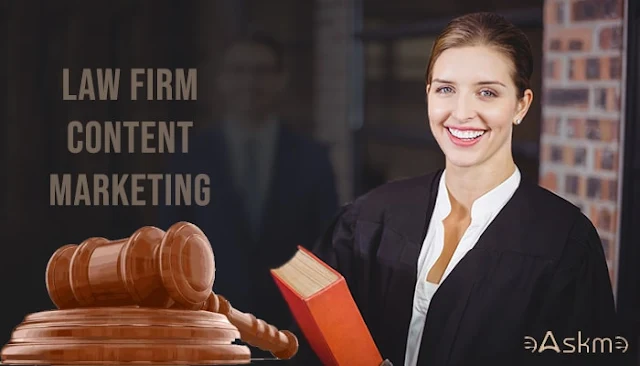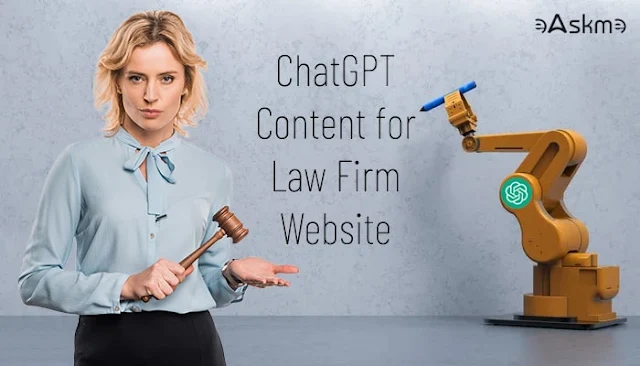Law Firm Marketing Strategies decide the success of the business building. You must use the latest technologies to promote legal services to the target users.
Law firm operates in the legal industry. It is tough and competitive and requires knowledge and skills to perform better than the other legal firms. Modern tactics and the latest technologies can grow Law Firm business at a multiplying rate.
 |
| Best Law Firm Marketing Strategies for Business Success in 2025: eAskme |
Marketers are using PPC ads, SEO strategies, Content marketing, etc., to improve the organic reach of law firm business. It is a must to match the user intent when targeting organic search.
Customization and personalization make a user find a business interesting. With the right strategies, you can grow your law firm business or your client's law firm business in 2025.
Here are the best marketing strategies to improve your law firm business in 2025.
Law Firm Marketing Calendar:
In a law firm marketing, a marketing calendar plays a crucial role. You have 365 days in a year.
When you plan a marketing calendar, you also plan what you must do each day for the next 365 days. A marketer will take on essential tasks to improve the result.
Align marketing goals of law firms with marketing campaigns. It will help you track the campaign's success.
Your marketing calendar should include the type of law firm marketing campaigns, budget, content formats, important dates, etc.
Outlining each task for the next 365 days will help you out. Your marketing approach will become more focused.
Use multiple platforms to market law firm business, such as social media, TV, billboards, print ads, SEO, PPC ads, etc., and target users with both paid and organic marketing.
Law Firm Digital Marketing:
Digital marketing is needed in law firm marketing.
Marketers should use SEO strategies to target law firm customers and ensure a branded online presence.
Create content that adds value to the target user. Share content on social channels, and promote with ads. Take the help of PR to spread the word about critical events. Get featured in media publications. Boost authority.
Ads on Social Media sites and search engines are costly but necessary. Such ads are cheaper than traditional advertising formats.
At the same time, organic users can be targeted by creating content that can rank better in SERP. Law firms can reach a wide audience with organic ranking and traffic without following costly tactics.
A successful law firm's marketing strategy focuses on increasing the reach daily without being noisy. The focus should be on delivering value and user intent.
Not only advertise and target organic users but also analyze the impact of digital marketing. Find issues in digital marketing strategies, fix content, and campaign for better results.
Stop wasting money on SEOs without experience.
Law Firm and Personalized Marketing:
Law firm clients are interested in personalized content and marketing. Clients have different issues, and they want legal help to resolve them.
Your marketing message should appeal to clients' legal problems. Clint only chooses a law firm if he trusts that.
Law firm content marketing should deliver trustworthy messages with the intent to solve the client's legal situation.
Social media targeting is about filtering targeted users and finding ways to reach them.
Platforms like Facebook allow marketers to use custom audience settings in campaigns to reach potential clients. Create campaigns to build email lists, increase website visits, and install apps.
Custom audiences create the ground for "Look alike" audiences. It boosts the reach to a broader audience with similar intent.
Google Analytics 4 for Law Firm Marketing:
Google Analytics 4 is the best way to analyze user behavior on your law firm's website. It is a free tool with all the necessary tracking features.
Check your GA4 report to find out when and how a user visits your website, which pages are more valuable for the user, when the user leaves your website, etc.
It is easy to find out issues within your content or website structure. Use this data to optimize your website and improve content quality.
You can also track:
- Referral traffic
- Organic traffic
- Paid promotions
- Appointments
- Contact submissions, etc.
Google
Analytics 4 displays the devices your target clients are using.
Optimizing your website for mobile devices is a must for better results.
Law Firm Marketing with PPC Ads:
PPC ads are the direct way to reach target clients in organic search. You can use PPC ads on major search engines such as Google, Bing, etc.
Displaying your ad on top of organic results is a significant benefit of PPC ads. It ensures better visibility and more traffic.
Your PPC campaign should be optimized with the following:
- Target location
- Keywords
- Demographics, etc.
PPC gives you better control over your marketing budget. You can set a daily, monthly, or weekly budget.
Note: PPC ads cost you money. Hiring a PPC expert to create or run a PPC campaign for your law firm is best.
PPC optimization is necessary to avoid a lot of money with fewer results.
Best PPC Campaign Strategy:
- Use landing pages.
- A/B testing
- Use Call-to-action.
Legal Directories for Law Firm Marketing:
Submitting your law firm to legal directories is another strategy to reach the target clients.
Clients looking for law firms on legal directories can find your business quickly.
Always list on the renowned and trusted legal directory. It can also help in SEO.
Local directory listing is a great way to tell search engines about your law firm's location.
Directory listing also works as a link-building strategy. But don't overdo it.Google Local Service Ads for Law Firm Marketing:
Law firms target clients in the local area. Local SEO is only sometimes enough to reach legal clients.
Google's Local Services Ads is the best platform for finding local customers and generating leads. It is a cost-effective way to reach target customers. You can set up ads for targeted areas or geo-location.
Local Services ads follow the pay-per-lead method. You will only be charged when you get the client's contact.
Another benefit of Google Local Services Ads is that they display at the top of organic results. The top placement makes it easy for organic users to reach the business.
Note: Only Google-verified businesses can use Local Services Ads. Verifying your business with Google is another way to display trust and credibility.
Legal clients only choose verified law firms.
Targeting the local area is the best way to ensure clients with a "near me" search can reach your business.
LSA and local targeting are the best combination for generating massive leads.
Local service ads focus on mobile users. Your law firm gets direct contact with clients using email addresses, phone numbers, etc.
You can even use Local Service Ads without a website or landing page.
Note: Verify Google My Business Profile and add necessary information such as phone number, address, working hours, social media posts, etc.
Law Firm Video Marketing:
Legal clients also love video content. Videos are great for digital marketing.
Videos are more engaging than any other content type.
Create engaging videos with expert information and details of services and solutions.
Share videos on your law firm's website, emails, YouTube, and other social media channels.
Professional law firm videos get engagement and are suitable for SEO. Video helps your client understand the history of your business and its success.
You can also start your Law Firm YouTube channel.
Law Firm Remarketing:
Remarketing or marketing to past and existing clients is a great way to generate more business.
Satisfied legal clients will land more business. You get referral business.
You can also use tools like Zappy Cards, BirdEye, etc., to improve word-of-mouth referrals.
Send email newsletters to your past or existing clients. Let them know about your latest achievements.
Stay connected to improve relationships.
Law Firm Local Engagement:
Local engagement is the strong point of any law firm's marketing strategy.
Be active in your local community. Participate in social events. Promote a non-profit business. These are the easy ways to become the talk of the town and spread awareness.
Awareness, relationships, and connections are essential for the success of a law firm. Law firm marketing strategies should ensure that this is happening.
Conclusion:
The above law firm's marketing strategies in 2025 ensure success. Use law firm marketing tactics with authority, trust, and optimization.
Use modern marketing technologies, be part of active legal communities, add value to client's experience, and turn your law firm into a brand.
Follow these tactics to lure more legal clients for more revenue.
If you have any questions or suggestions, feel free to ask me via comments.
Share it with your friends and family.











